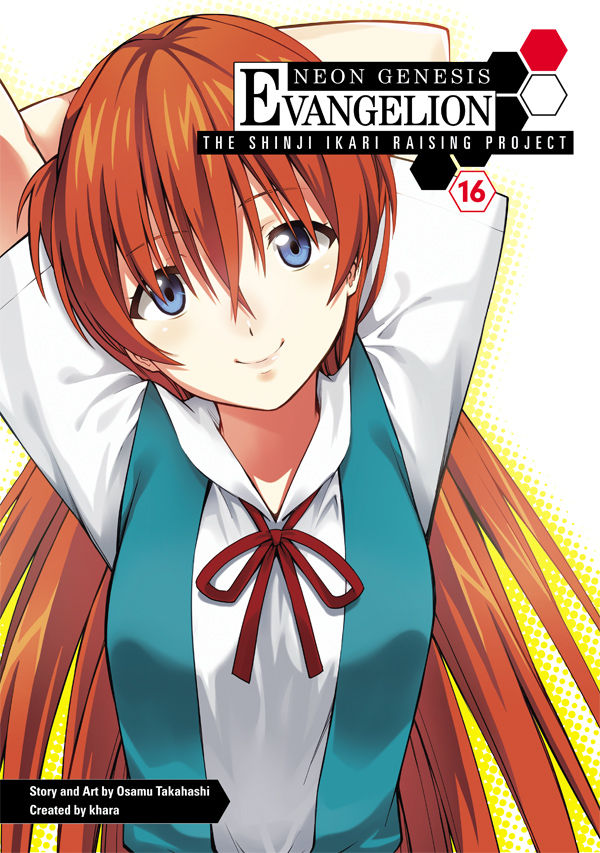The longest-running Evangelion manga returns with vol. 16 of The Shinji Ikari Raising Project, in stores this week!
Even the original Neon Genesis Evangelion manga by series co-creator and character designer Yoshiyuki Sadamoto only ran for 14 volumes, and as someone who’s been a fan of Evangelion since it first came out, I’m always intrigued to note the longevity of The Shinji Ikari Raising Project—especially as the series is inspired by a single scene in the original TV version of the anime’s final episode, where, as part of the Instrumentality (and, perhaps, as part of the meta-nature of that episode, which makes nods to the fact the show is a performance with a script and stage) the characters see a vision of their life as if Evangelion had been more like an anime romantic comedy.
You could also further note that The Shinji Ikari Raising Project is a manga series that began running in Japan at about the time as the current (and currently incomplete) Evangelion Rebuild film series—films that have gotten progressively darker and more dramatic (although there were moments in 2.22 that reminded me of The Shinji Ikari Raising Project). And yet these two authorized versions of Evangelion have co-existed among the Japanese fans.
If I were to explain it, my sense is that Evangelion fans have always had a dual perspective on the series—they are drawn to its drama and intensity, yet at the same time they have great affection for its characters, and like seeing them in a happy and lighter mood as well. Maybe The Shinji Ikari Raising Project—the most successful of all the Evangelion manga spinoffs—provides precisely that counterbalance. Or maybe it simply helps to restore the balance back to the original 1995-96 TV series that started everything, which after all ended many of its episodes with the voice of Misato (played by Kotono Mitsuishi, also famous as the voice of Sailor Moon) promising you that the next episode will give the fans service…?
—Carl Horn
Manga Editor

The longest-running Evangelion manga returns with vol. 16 of The Shinji Ikari Raising Project, in stores this week!
Even the original Neon Genesis Evangelion manga by series co-creator and character designer Yoshiyuki Sadamoto only ran for 14 volumes, and as someone who’s been a fan of Evangelion since it first came out, I’m always intrigued to note the longevity of The Shinji Ikari Raising Project—especially as the series is inspired by a single scene in the original TV version of the anime’s final episode, where, as part of the Instrumentality (and, perhaps, as part of the meta-nature of that episode, which makes nods to the fact the show is a performance with a script and stage) the characters see a vision of their life as if Evangelion had been more like an anime romantic comedy.
You could also further note that The Shinji Ikari Raising Project is a manga series that began running in Japan at about the time as the current (and currently incomplete) Evangelion Rebuild film series—films that have gotten progressively darker and more dramatic (although there were moments in 2.22 that reminded me of The Shinji Ikari Raising Project). And yet these two authorized versions of Evangelion have co-existed among the Japanese fans.
If I were to explain it, my sense is that Evangelion fans have always had a dual perspective on the series—they are drawn to its drama and intensity, yet at the same time they have great affection for its characters, and like seeing them in a happy and lighter mood as well. Maybe The Shinji Ikari Raising Project—the most successful of all the Evangelion manga spinoffs—provides precisely that counterbalance. Or maybe it simply helps to restore the balance back to the original 1995-96 TV series that started everything, which after all ended many of its episodes with the voice of Misato (played by Kotono Mitsuishi, also famous as the voice of Sailor Moon) promising you that the next episode will give the fans service…?
—Carl Horn
Even the original Neon Genesis Evangelion manga by series co-creator and character designer Yoshiyuki Sadamoto only ran for 14 volumes, and as someone who’s been a fan of Evangelion since it first came out, I’m always intrigued to note the longevity of The Shinji Ikari Raising Project—especially as the series is inspired by a single scene in the original TV version of the anime’s final episode, where, as part of the Instrumentality (and, perhaps, as part of the meta-nature of that episode, which makes nods to the fact the show is a performance with a script and stage) the characters see a vision of their life as if Evangelion had been more like an anime romantic comedy.
You could also further note that The Shinji Ikari Raising Project is a manga series that began running in Japan at about the time as the current (and currently incomplete) Evangelion Rebuild film series—films that have gotten progressively darker and more dramatic (although there were moments in 2.22 that reminded me of The Shinji Ikari Raising Project). And yet these two authorized versions of Evangelion have co-existed among the Japanese fans.
If I were to explain it, my sense is that Evangelion fans have always had a dual perspective on the series—they are drawn to its drama and intensity, yet at the same time they have great affection for its characters, and like seeing them in a happy and lighter mood as well. Maybe The Shinji Ikari Raising Project—the most successful of all the Evangelion manga spinoffs—provides precisely that counterbalance. Or maybe it simply helps to restore the balance back to the original 1995-96 TV series that started everything, which after all ended many of its episodes with the voice of Misato (played by Kotono Mitsuishi, also famous as the voice of Sailor Moon) promising you that the next episode will give the fans service…?
—Carl Horn
Manga Editor